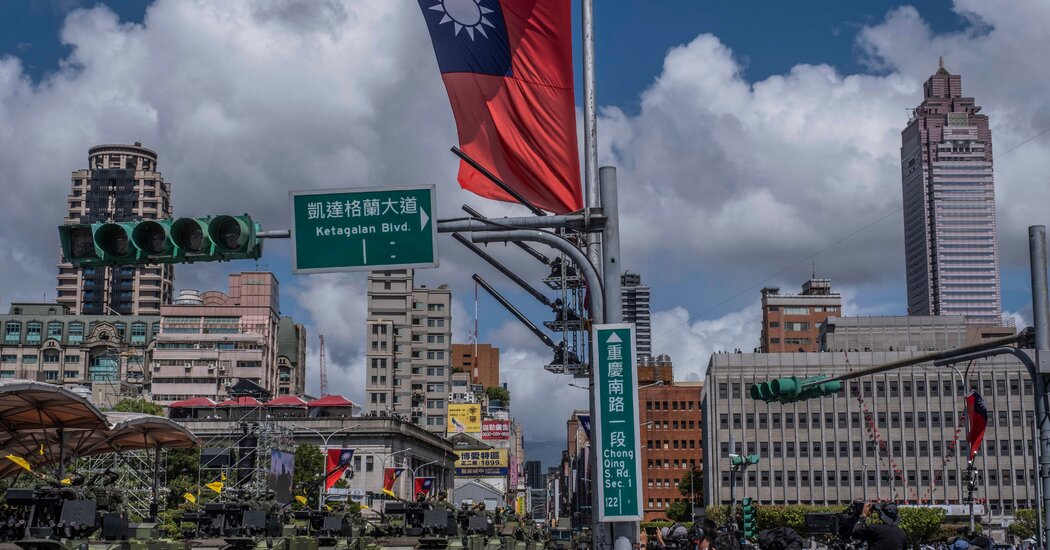
WASHINGTON — The Biden administration is quietly pressing the Taiwanese government to order American-made weapons that would help its small military repel a seaborne invasion by China rather than weapons designed for conventional set-piece warfare, current and former U.S. and Taiwanese officials say.
The U.S. campaign to shape Taiwan’s defenses has grown in urgency since the full-scale Russian invasion of Ukraine ordered in late February by President Vladimir V. Putin. The war has convinced Washington and Taipei that a Chinese invasion of Taiwan in the coming years is now a potential danger — and that a smaller military with the right weapons that has adopted a strategy of asymmetric warfare, in which it focuses on mobility and precision attacks, can beat back a larger foe.
American officials are re-examining the capabilities of the Taiwanese military to determine whether it can fight off an invasion, as Ukrainian forces have been doing.
President Tsai Ing-wen of Taiwan is trying to orient the country’s military toward asymmetric warfare and has moved to buy a large number of mobile, lethal weapons that are difficult to target and counter.
But some Taiwanese defense officials are resistant. And U.S. officials have decided that certain weapons systems the Taiwanese Defense Ministry has tried to order — the MH-60R Seahawk helicopter made by Lockheed Martin, for example — are not suited for warfare against the Chinese military.
The U.S. officials have warned their Taiwanese counterparts that the State Department would reject such requests. They have also told American weapons makers to refrain from asking U.S. agencies to approve Taiwanese orders of certain arms. The procurement process is complex, with many parties weighing in.
The push by the Biden administration has broadened and accelerated similar efforts by officials in the Trump and Obama administrations. Democratic and Republican officials and lawmakers say one lesson of the Ukraine war is the United States must help transform Taiwan into a “porcupine” to deter potential attacks from China.
The nine current and former American and Taiwanese officials familiar with the discussions spoke on the condition of anonymity because of the sensitivity of the negotiations.
“I sense there has been a shift,” said Bonnie S. Glaser, a East Asia analyst at the German Marshall Fund of the United States. “It started before the invasion of Ukraine, but I think it has really, really solidified since then. There has been this wake-up call in the Pentagon to make sure Taiwan is serious, and we need to get serious too.”
State Department and Pentagon officials have been involved in the discussions with the Taiwanese government. Lawmakers and congressional aides have delivered similar messages. The Biden administration also sent a bipartisan delegation of five former senior national security officials to Taiwan in early March to talk to Ms. Tsai and other officials about the country’s defense strategy and weapons procurement, among other matters.
“Continuing to pursue systems that will not meaningfully contribute to an effective defense strategy is inconsistent with the evolving security threat that Taiwan faces,” a State Department representative said in a statement. “As such, the United States strongly supports Taiwan’s efforts to implement an asymmetric defense strategy.”
Another State Department official said conversations with Taiwan on weapons took place early in the Biden administration, and both governments are now looking at lessons learned from the Ukraine war.
For decades, Communist-ruled China has vowed to bring Taiwan, a democratic island with de facto independence that is a U.S. partner, under its control. While there is no sign that war is imminent, President Xi Jinping of China has adopted a more aggressive foreign policy than his predecessors, and U.S. officials fear he might invade Taiwan to seal his legacy.
The Taiwan Relations Act of 1979 obligates the U.S. government to provide equipment of a defensive nature to Taiwan. Every administration since then has maintained a policy of “strategic ambiguity” on the question of military intervention — meaning they have not explicitly said whether the U.S. military would defend Taiwan if China attacked.
President Biden has said he would keep U.S. troops out of the fight in Ukraine but has authorized shipments of small, mobile weapons that have helped Ukrainian forces defeat the Russian military in critical battles, including around Kyiv, the capital. The Ukrainian military has used an asymmetric strategy to great effect, mounting a dogged resistance against Russian tanks, fighter jets and battalion groups. Ukraine’s arsenal includes Javelin and Stinger missiles as well as armed drones.
A Chinese invasion of Taiwan would differ from the Russian military’s efforts in Ukraine and be more difficult. Chinese warships would have to cross more than 100 miles of water in the Taiwan Strait and land forces on the island. The Chinese and Taiwanese sides of the strait are bristling with missiles aimed at each other, and the United States and allied nations regularly send warships through the waterway as a show of force.
Resupplying weapons to a besieged Taiwan, an island, could prove more difficult for the United States and its allies than it has been in Ukraine. As a result, some officials are considering stockpiling large amounts of munitions in Taiwan.
In 2019, the State Department authorized a $2.2 billion sale of weapons to Taiwan that included 108 M1A2 Abrams tanks. Some U.S. officials at the time privately criticized the sale, saying that if Chinese forces advance far enough in an invasion that Taiwan has to use tanks, then the island would probably be doomed.
Many of Taiwan’s more recent orders have been in line with an asymmetric strategy. But some Taiwanese officials continue to press American officials on requests for expensive, conventional platforms like the Abrams tanks.
Several defense experts in Taiwan argue that the island will need some traditional systems to prepare for different war scenarios involving China.
Russia-Ukraine War: Key Developments
Victory Day concerns. President Volodymyr Zelensky called on citizens to heed local curfews in the face of an increasing threat of Russian attacks. Officials in the country fear that President Vladimir V. Putin might use Russia’s Victory Day holiday on May 9 to ratchet up fighting and turn what he calls a “special military operation” in Ukraine into explicit, all-out war.
“We have accepted many of the recommendations from the United States, but we still need to have some space to make preparations for the possibility of other, longer-term scenarios,” said Chieh Chung, a security analyst with the National Policy Foundation in Taipei. He said he was worried that the Ukraine war had caused Americans to dig in even deeper on the idea of asymmetry, without considering Taiwan’s specific needs.
“Our artillery systems are so old. They need to be upgraded,” he added. “How can you ask us to take World War II-era equipment to defend against China?”
On Thursday, Chiu Kuo-cheng, the defense minister, told Parliament that the ministry had dropped a plan to buy the MH-60R helicopters because they were too expensive. He did not mention that American officials had been pushing Taiwan not to buy the helicopters. American and Taiwanese officials are also debating whether Taiwan should buy E-2D aircraft made by Northrop Grumman.
In recent weeks, Taiwanese officials have expressed their own frustrations with the U.S. government and American weapons makers, complaining of delivery delays and unfilled orders. Ms. Tsai herself has sent messages to Washington, officials said.
Mr. Chiu said two arms orders had been delayed. One is a purchase of M109A6 Paladin self-propelled howitzers, made by BAE Systems, that U.S. officials said was being held up because of inadequate production capacity, according to Taiwanese officials. The defense ministry said it was now considering several alternatives offered by the United States, including HIMARS rocket artillery launchers. BAE Systems told Defense News this past week that it had the capacity to build the howitzers for Taiwan.
An order of Stinger antiaircraft missiles has also been delayed, Mr. Chiu said.
Ukraine has asked for regular shipments of Javelin and Stinger missiles, and the Biden administration is providing them. Mr. Chiu said Taiwan had already signed a contract for Stingers and paid for them. The State Department official said the Ukraine war has not affected Taiwan’s order.
Stingers are among the kinds of weapons that U.S. officials have encouraged Taiwan to order. The Americans have also pushed Taiwan to buy Harpoon anti-ship missiles made by Boeing. In April, Ukrainian forces sank a Russian flagship, the Moskva, by using Neptune anti-ship missiles, which are made in Ukraine. That attack, which was carried out with the help of intelligence provided by the Americans, has been a signature moment in the war.
Some U.S. officials say Taiwan should also increase its purchases of coastal air-defense missile systems, armed drones and sea mines.
“The question is: How focused are you on asymmetric warfare compared to other priorities?” said Evan S. Medeiros, a senior Asia director on President Barack Obama’s National Security Council.
Suspicions in Washington and Taipei of China’s intentions toward Taiwan have increased during the Ukraine war because Chinese officials have consistently supported Mr. Putin’s rationales for his invasion and helped spread disinformation and conspiracy theories that favor Russia.
On Feb. 4, as Mr. Xi and Mr. Putin met in Beijing before the start of the Winter Olympics, their two governments released a joint statement that said their partnership had “no limits.” A line said Russia affirmed that Taiwan “is an inalienable part of China.”
Edward Wong reported from Washington, and Amy Qin from Taipei, Taiwan.




